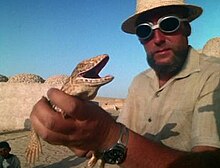Fata Morgana (1971 film)
| Fata Morgana | |
|---|---|
 | |
| Directed by | Werner Herzog |
| Written by | Werner Herzog |
| Produced by | Werner Herzog |
| Starring | Eugen Des Montagnes |
| Narrated by | Lotte Eisner |
| Cinematography | Jörg Schmidt-Reitwein |
| Edited by | Beate Mainka-Jellinghaus |
| Music by | Blind Faith The Third Ear Band Leonard Cohen |
Release date | 1971 |
Running time | 79 min |
| Language | German |
Fata Morgana is a film by Werner Herzog, shot in 1969, which captures mirages in the desert. Herzog describes the film as "a documentary shot by extraterrestrials from the Andromeda Nebula, and left behind."[citation needed] The only narration consists of a recitation of the Mayan creation myth (the Popol Vuh) by Lotte Eisner, and text written by Herzog himself.
Film critic David Thomson describes Fata Morgana as "extraordinary": "[The] desert is a model for mankind. The film is in three sections: the first showing an unpeopled, beautiful wasteland; the second introducing signs of human wreckage; and the third showing wretched vestiges of life. Totally imaginative, it is a legend of life at extremes that contrasts with 2001: A Space Odyssey. Whereas Stanley Kubrick has an all-powerful, riddle-making consciousness behind the universe, Herzog's creator is as fallible, quirky and uncertain as man himself."[citation needed]
Production
The film was initially intended to be presented with a science fiction narrative, casting the images as landscapes from another planet. This concept was abandoned as soon as filming began, but was realized in his later films Lessons of Darkness and The Wild Blue Yonder. [1]
Much of the film's footage consists of long tracking shots filmed by cameraman Jörg Schmidt-Reitwein from the top of a VW bus with Herzog driving. The crew smoothed out the road themselves to prepare the shots.[1]
Herzog and the crew encountered many problems during the filming, most notably being imprisoned because cameraman Schmidt-Reitwein's name was similar to the name of a German mercenary who was hiding from the authorities and had recently been sentenced to death in absentia.[1]
References
- ^ a b c Herzog, Werner (2001). Herzog on Herzog. Faber and Faber. p. 303. ISBN 0-571-20708-1.
External links
